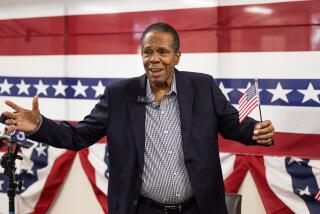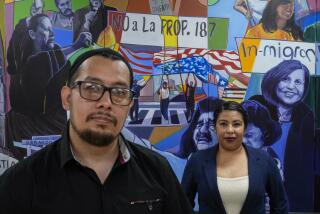A final gift: Citizenship
- Share via
On a recent Friday, as the sun’s rays first slipped inside their little home in Glassell Park, the parents of an Army infantryman woke to a mix of anticipation and sadness.
Rodolfo gazed at a wood-framed photo of his eldest son, Ryan, a slim soldier dressed in sharp fatigues.
Rachel thought of how today would mark the end of a long journey: Within hours, she and Rodolfo would become Americans at last. Then she thought of how this came to be, of Ryan, longed for him as only a mother can.
“Good morning Amboy,” she said, using the nickname Ryan had grown up with in the Philippines -- Amboy, short for “American Boy.” “We love you Amboy. We just wish you were here to see this day.”
Rachel’s eyes focused through a window on a grassy bluff above her home. There, near a stone wall and a cluster of fir trees at Glendale’s Forest Lawn Memorial-Park, was Ryan’s grave.
::
In 2008, after more than a decade waiting for his name to rise to the top of a waiting list, Rodolfo Hizon, a cabdriver, left Manila and moved with Ryan and his two other children to America. They arrived in Los Angeles with green cards and hope, but little else.
They didn’t have Rachel. She’d been held back by immigration officials, separated from her family because she and Rodolfo had never married.
Not more than a month passed before Ryan surprised his family by enlisting in the Army. It was an odd fit, and not just because he wasn’t yet a citizen. Ryan was quiet and slight, a fun-loving practical joker, true, but also an introspective kid who cried easily and hardly had an aggressive bone in his body. He’d never touched a gun, never talked of hurting anyone, never mentioned anything about joining any nation’s army.
He hoped the military would give him focus. But really, there was more to it than that. His mother was on the immigration list, waiting her turn, but nobody knew how long it would take. Four years more? Eight? Ryan knew that by joining the Army during wartime he could hasten U.S. approval of his citizenship. Then he could sponsor Rachel, speeding her immigration.
“I knew what he was doing, but I asked him to quit,” said Rachel Santiago, 44. They’d always been extremely close, but when he was sent last winter to Afghanistan it had been three years since she’d seen her son. “When he finally was deployed, I told him, ‘Amboy, come home. Don’t go.’ ”
In early March, two soldiers arrived at Rodolfo’s doorstep. Rodolfo opened the door, and knew. Ryan had told him what to expect if two grim-faced military men ever set foot on the front porch like this.
Ryan was dead at 22.
“It was like a terrible dream,” said Rodolfo, a cafeteria worker at a Pasadena hospital. “Losing my son? How could this be?”
Rodolfo, 43, had been so worried for his soldier-son that often he could not sleep at night. But he supported the war then and he supports it now. Not that he’d ever be too vocal about it, being a shy man who holds his thoughts and emotions tight.
Still, his voice quavers and tears well up as he describes a series of moments that unfolded after his son’s death. How Ryan was granted U.S. citizenship posthumously. How immigration officials allowed Rachel to visit America in time for his wake.
And then, finally, how an official brought Rachel and Rodolfo to her office and gave them bittersweet news: Since Ryan had died at war, his parents could now become citizens without more than a few months’ wait.
::
All of this explains the melancholy mix of emotion that filled their home on that recent Friday. It was 6 in the morning and within hours they would attend a naturalization ceremony.
Rodolfo pulled on white socks and a crisp white shirt. He smiled, eyes passing over a row of medals awarded to Ryan for bravery and marksmanship. Rachel stood nearby, lost in memories of her son as a baby, as a teen in his Nike shoes and his Notre Dame jacket, as a soldier.
With their other children, Rochelle, 21, and Russell, 19, they drove to Montebello, where immigration officials were holding a ceremony inside a high-walled banquet hall to induct 801 immigrants.
Ryan’s parents were guests of honor, bathed in attention despite soft-spoken protests. “We don’t want to stand out,” Rodolfo said. “Nothing special for us, please.”
But it was impossible not to notice them, fidgeting nervously in the front row, clutching miniature American flags: two parents, two kids, one empty seat -- Ryan’s.
A black-robed magistrate judge rose to a podium.
“Today the oath of citizenship is given renewed meaning,” she said. “Among our new citizens are two parents whose son, Ryan Hizon, was a decorated soldier in the United States Army.... Tragically, Ryan was killed in action this year....”
Rodolfo, his eyes glistening, brushed Rachel’s trembling shoulder with his right hand.
“He made the ultimate sacrifice for his country....”
Rachel looked down, her somber gaze frozen on the carpeted floor.
“His life reminds us of the opportunities and the responsibilities of citizenship. Today, Ryan’s parents become citizens. They become part of the fabric of a nation that has been enriched by immigrants who bring with them a new energy, sacrifice and commitment to America.”
Ryan’s parents raised their hands to their hearts and pledged loyalty to their adopted nation. Americans now, they slipped out of the hall. Something important needed to be done.
The sun was still fresh on the cemetery bluff when Ryan’s family arrived at his grave.
Rodolfo and Rachel hugged Russell and Rochelle, who now wait for their own citizenship. Together, they prayed for Ryan, speaking to him in silence.
“Hello Ryan, I love you,” Rodolfo said. “Let me tell you about the wonderful thing we just did....”
“Thank you, Amboy,” Rachel said. “Thank you for what you have done.”
“Amboy, we will never forget.”
--
More to Read
Sign up for Essential California
The most important California stories and recommendations in your inbox every morning.
You may occasionally receive promotional content from the Los Angeles Times.











